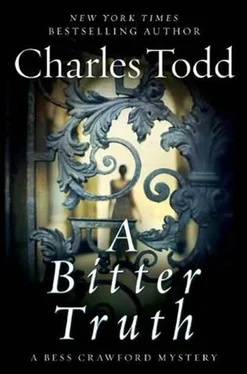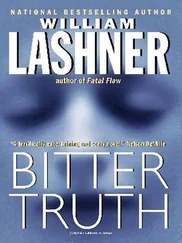“He probably stopped at The King’s Head,” Roger said under his breath, but Mrs. Ellis caught the remark.
“Be a little generous, my dear,” she admonished her son.
By the time we had returned to the hall, I could hear a motorcar coming up the drive.
To everyone’s surprise, it was Henry, grinning from ear to ear. Margaret rushed into his arms with a cry of joy, and then clung to him, as if afraid he’d fly away if she let him go.
Henry, an artillery officer, was dark and slim, a contrast to Margaret’s fairness, but I saw a nervous tic by his left eye. I found myself wondering if he had come by this leave medically, when a doctor took note of the early signs of exhaustion and stress.
Soon afterward Alan’s widow arrived, accompanied by her brother, Thomas Joyner, a quiet man with a Naval beard and little to say for himself. He had lost an arm when his cruiser was torpedoed, and was now posted to the Admiralty. We had several friends in common, and he seemed to relax as we talked.
Finally, George Hughes arrived. From the flush on his face I couldn’t help but think that Roger Ellis was right-he’d stopped in Hartfield for a little Dutch courage. But whatever he’d had to drink there, he was cold sober now. As he turned to greet us, his impeccable uniform was splashed with blood, and across his forehead was a bruised area that was also bleeding, as if he’d struck his head hard against something. The knuckles on one hand were badly scraped. Mrs. Ellis had returned by that time, and he apologized immediately for the delay as she broke off her greeting to stare at his face.
“But George, what on earth happened-?” she asked.
“I’m all right, although the motorcar is a little the worse for wear. That bend in the road-you know it? After that long straightaway? I came around it and there was a dead tree toppled directly in my path.”
“A tree? George, there aren’t any trees just there.”
“I know. All I could think of was that it had fallen from a cart carrying wood. I can tell you I was damn-very lucky. I think Roger and I ought to move it before someone else comes to grief. I tried, but I didn’t have any rope in the motorcar. It would take that to budge it.”
“By all means! He’s just coming down. George, this is Sister Crawford, a friend of Lydia’s here for the weekend. You’ll allow her to look at your forehead, won’t you? And what about your ribs? Did you strike the steering wheel? Did you do any damage there? I’d hate to think-they’ve only just begun to heal .”
He touched his chest with his fist. “So far I can breathe without difficulty. But it was a very near thing, I can tell you. No, don’t trouble, Sister,” he went on as I came forward. “A little soap and water-but Daisy could have a look at my tunic, if she would. Before the blood sets.”
Mrs. Ellis whisked him away to the kitchens, and on the way I heard her calling to her son. Ten minutes later, Roger and George went out to the motorcar, and I heard them drive off.
I had just gone up for a shawl to put around my shoulders when the motorcar returned. As I came into the hall, I could hear George apologizing again, this time to Roger. I caught the last words as they opened the door and came in quickly, shutting out the wind.
“… but it was there, as certain as I am here before you.”
“Yes, all right. We’ll say nothing to Mother, shall we?” Roger was a little ahead of his friend, his face set. He walked on, leaving George to talk to me. I could see that the wound had been cleaned quite efficiently, but he sat down in one of the hall chairs like a man who had been shamed.
I was about to make an effort at conversation, when Henry came into the hall and said, “What’s this I hear about a tree in the road? Good Lord, man, look at your face! I didn’t see anything when I came through, and I couldn’t have been that far ahead of you.”
“I expect,” George said with an effort at lightness, “I mistook a ewe for a tree. There was a scattering of fleece across the road. But no blood. I think honors go to her.”
“Yes, well, how’s the motorcar?”
They went off discussing the left wing, and I remembered the scraped knuckles on George’s hand. He hadn’t got that from charging into a flock of sheep. It looked more like trying to deal with the tree. Whatever Roger Ellis tried to tell him.
He smiled as he passed me, but it didn’t reach his haunted eyes.
We gathered in the hall for drinks that evening, and I sat beside Gran, who was enjoying having her family around her, her bright eyes taking in what everyone was wearing and all that was said.
She turned to me at one point, saying, “This is a pale shadow of how we entertained in my day. My husband knew so many people. The house was always full, and we had the staff to cope with the guests. There are photographs somewhere. I’m sure we kept them.”
Dinner that night was rather ordinary fare, but no one seemed to mind, and there was a good wine from the cellars.
It wasn’t until we had all gathered again in the hall that George asked the question that everyone else had been too polite to bring up. “Whatever happened to your face, Lydia?”
I thought at first that he’d drunk too much port to remember his manners.
But then he added gently, “We can’t help but see the bruising and the black eye. I think you’ll be more comfortable if we stop trying to pretend we don’t notice.”
She turned beet red, and everyone stared, then looked quickly away.
Roger answered before she could. “Ran into one of the cupboard doors while looking for the wineglasses. The doctor says no harm done.”
Lydia smiled gratefully at him, and I wondered if he’d been prepared for questions, because the response had seemed so natural and unforced.
I’d watched her without seeming to, and I rather thought her condition was improving. There was no sign of either a headache or dizziness, and I had the feeling that she and Roger were trying to make amends for their quarrel. She seemed more comfortable with him, and once I saw her touch his hand while laughing over a story he’d told. It was possible that I could leave with Simon the next afternoon after all.
That buoyed my spirits.
The evening was ending on a pleasant note until there was one disruptive comment from George Hughes.
“I’d have thought the drawing room would be more comfortable on a night like this,” he said when a sudden gust of wind and rain roared down the chimney, sending woodsmoke billowing out of the great expanse of hearth, making us cough. “Besides, I miss the portrait. I always look forward to seeing it again.”
Gran said sharply, “George, you ought to be in your bed. As we all should. It’s growing late.”
He took out his watch, looked at the time, and put it away. “So it is.”
That was the signal for everyone to rise and murmur something about the tiring drive. I stayed in the hall until they had all gone up, and then followed. Roger passed me coming back to see to the fire, and I said good night.
He nodded, and went on his way without speaking.
I went once to the room over the hall to look for Lydia-George had been given the guest room where she’d spent last night-but she wasn’t there. Smiling to myself, I slipped quietly back to my own bed.
The next day went fairly well, the sun coming out in the early morning hours and staying with us most of the afternoon before slipping again behind dark clouds.
We went to St. Mary’s Church in Wych Gate in a convoy of motorcars at two o’clock in the afternoon. The track meandered and turned back on itself, and then followed a line of trees.
I could see the church now, the tower tall as the tallest tree, the red brick vivid amongst the bare branches. There was a high iron gate in the wall that surrounded the churchyard, and no sign of a Rectory. We passed the main entrance and turned into a broad grassy space just beyond. To one side I could see a smaller gate letting into the churchyard, and on the far side, I could hear the sound of water splashing over stone as the motors were cut off. A path, almost lost in the tangled growth under the trees, must lead to a nearby stream, in spate after all the rain.
Читать дальше












